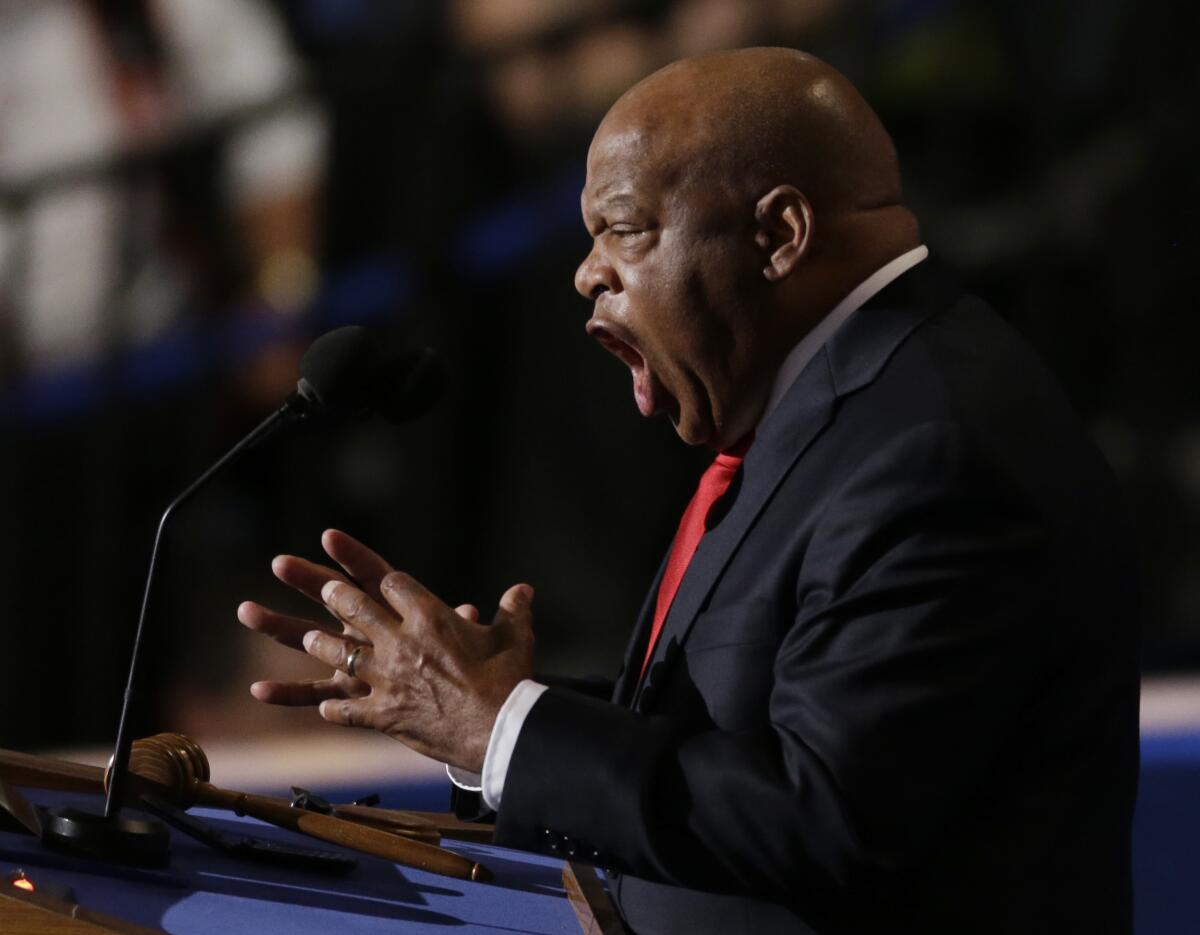Editorial: The humbling example of John Lewis

Few life stories are as humbling as that of John Lewis, a civil rights icon and longtime Democratic congressman from Georgia who died Friday at age 80. Hoping to provoke this country to renounce the oppressive discrimination against Black Americans, he walked into certain confrontations with racist cops, Ku Klux Klansmen, hate-spewing citizens and unjust institutions, unarmed and armored only with the nobility of his cause. And even after being beaten, jailed and threatened with worse, he did it again and again, determined to stay on the path of nonviolence and prove that hate could be overcome by love.
Who has that kind of courage? Who is so steadfastly principled?
Lewis was famed for many things he did in his younger days — he was one of the original Freedom Riders who put their lives on the line defending the integration of public buses; as the 23-year-old leader of the Student Nonviolent Coordinating Committee, he gave a fiery call to action at the famed 1963 March on Washington for Jobs and Freedom (a warm-up to the Rev. Martin Luther King Jr.’s riveting “I Have a Dream” speech); he was in the vanguard of a voting rights march out of Selma, Ala., in 1965 that was brutally attacked by police, who fractured Lewis’ skull. But as remarkable as that record is, it shouldn’t overshadow the role he played since his election to the House in 1986. He wasn’t an active legislator so much as a constant reminder of the gap between this country’s founding ideals and its reality. He was a partisan Democrat, yes, but more than that he was the conscience of the Congress, which is why he was admired by so many of its members on both sides of the aisle.
Losing Lewis’ voice is particularly gutting now, as the country is confronting anew the poison that he spent his life trying to extract. George Floyd’s death under the knee of a Minneapolis police officer triggered a wave of protests about police brutality, but the demand for reckoning goes well beyond that. We are being called to confront the structural racism and institutional barriers that have kept a knee on the neck of generations of Black, Latino and other disempowered Americans.
This country has enormous income inequality as well as a yawning wealth gap between white and Black and Latino Americans. The problems are getting worse, not better, as a disproportionate share of the gains from the decade of pre-COVID-19 economic growth were captured by the folks at the top of the economic ladder. Meanwhile, efforts to narrow the racial gap directly through programs like affirmative action are resisted by conservatives in legislatures and the courts, who argue for a “color-blind” approach that would cement the disadvantages brought about by centuries of discrimination.
Lewis put it this way in an op-ed for the Washington Post in 2011, on the 48th anniversary of the March on Washington: “Yes, we have come a great distance — but we still have a great distance to go.”
And sometimes it feels like we haven’t come that far after all. The scenes of police officers and federal agents in riot gear gassing and beating people during the Floyd protests are chillingly reminiscent of the 1960s and early 1970s, as are the calls from the Oval Office for “law and order” and a militarized response to the demonstrations. Granted, the protesters have not always hewed to Lewis’ path of nonviolence, but too many times the clashes have been instigated and escalated by officers happy to deny people their 1st Amendment rights.
Lewis’ faith in nonviolent protest was coupled with a firm belief in the transformative power of democracy. That’s why one of his signal legislative achievements came long before he was elected to the House. The march he helped lead over the Edmund Pettus Bridge on the outskirts of Selma — and more pointedly, the horrifying racist violence it unleashed and exposed to the nation — galvanized support for the landmark Voting Rights Act of 1965, overcoming entrenched opposition from powerful Southern Democrats.
But to this country’s great shame, Lewis’ voting rights legacy is under increasing attack. Republicans across the country have used the myth of rampant voter fraud to engage in cynical voter suppression, buoyed by a disastrous 2013 Supreme Court ruling that allowed communities with histories of discrimination to adopt new voting rules without getting the Justice Department’s approval in advance.
The fight for justice and equality for all is never ending. Lewis liked to tell people, “Never give up, never give in, never give out.” The best way to honor his memory is to heed those words, especially when it comes time to vote.
More to Read
A cure for the common opinion
Get thought-provoking perspectives with our weekly newsletter.
You may occasionally receive promotional content from the Los Angeles Times.










